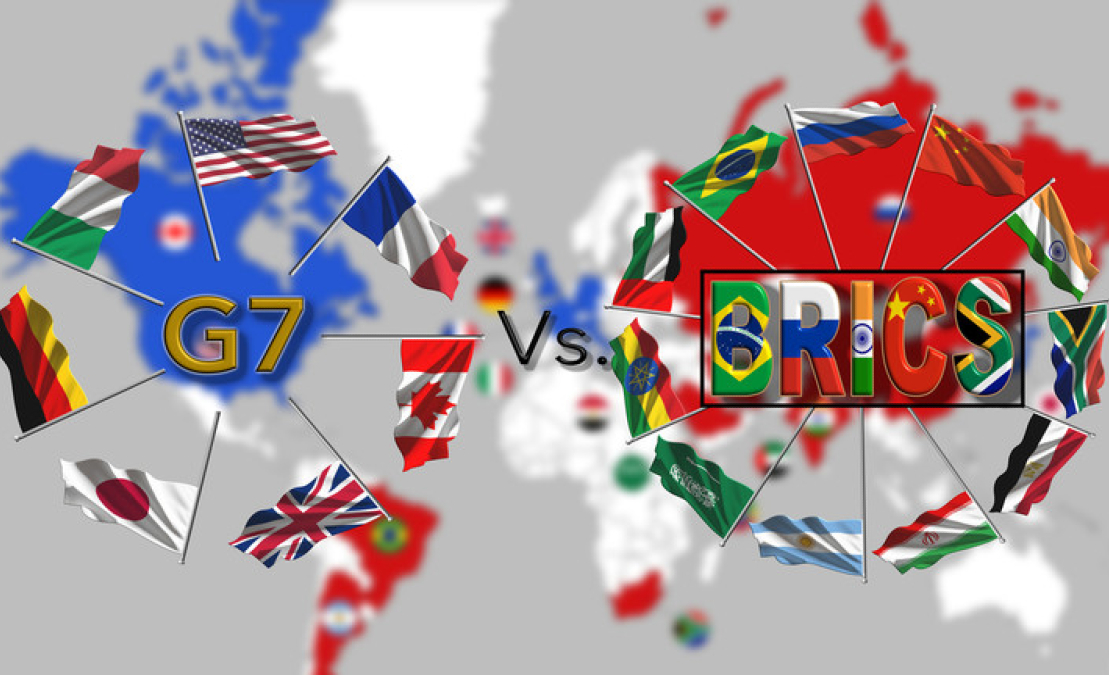A Diaspora View of Africa
Collapsing Economic Order Causes Challenges


By Gregory Simpkins
The prevailing world economic order since the end of World War II, established by the major powers at that time, is coming unraveled. Over the past year, I have written extensively on the reasons for developing countries, particularly in Africa, pulling away from Western countries. Over the past year, I have written extensively in my weekly column on The Habari Network about the massive sea change in the global economy and the elements motivating it.
For example, France has become a pariah in Francophone Africa, leading to their expulsion from some West African nations, the French system of requiring the deposit of former African colonies’ government funds in that country’s central bank while forcing Africans to borrow their own money back is likely to end in the near future.
Similarly, the reign of the U.S. dollar as the world’s reserve currency since the 1940s is under serious challenge. With the dollar being the most widely used currency in international trade, it affords the United States with the opportunity to borrow money at a much lower cost. It also allows the United States to deny the dollar’s use as part of sanctions, which has caused numerous countries, especially Russia and China, to want to get out from under this threat that has become an increasing reality.
This economic order was established ostensibly to create stability among the trading nations of the world. However, it served the interests of industrial powers much more than developing economies. In the early days after World War II, as many developing countries were still colonies of European countries, there was not the ability to overturn this situation. But increasingly, developing countries have become independent and are now using their agency to pursue their interests and security.
Over the years, developing country leaders have chafed at the blatant self-interest of industrial powers.
One recent example is the Western determination to prevent Russia from rebuilding its previous empire. The invasion of Ukraine was the last straw for Western nations, causing the imposition of sanctions that unfortunately resulted in collateral damages to nations uninvolved in the invasion.
The imposition of broad sanctions led to shortages of grain and fertilizer from Russia to developing nations in Africa and elsewhere for whom Russia was a major supplier. Russia, in turn, made it nearly impossible to receive shipments from the other major grain supplier in Europe: Ukraine, the country they had invaded.
With no Plan B to mitigate the economic and humanitarian damage caused by the impact of sanctions on Russia, affected nations understandably were resentful. After all, the goal of weakening Russia was a Western aim not shared by much of the rest of the world.
Now China is being targeted with new sanctions. A May 14 2024 news release from the White House, explained the need for a new package of economic sanctions on China:
“China’s unfair trade practices concerning technology transfer, intellectual property, and innovation are threatening American businesses and workers. China is also flooding global markets with artificially low-priced exports. In response to China’s unfair trade practices and to counteract the resulting harms, today, President Biden is directing his Trade Representative to increase tariffs under Section 301 of the Trade Act of 1974 on US$18 billion of imports from China to protect American workers and businesses.”
As a part of the sanctions package, the United States is increasing the tariff rate on electric vehicles under Section 301 from 25 percent to 100 percent in 2024.
The news release futher explained:
“With extensive subsidies and non-market practices leading to substantial risks of overcapacity, China’s exports of EVs grew by 70 percent from 2022 to 2023 – jeopardizing productive investments elsewhere. A 100 percent tariff rate on EVs will protect American manufacturers from China’s unfair trade practices.”
In a May 14 commentary for the Center for Strategic and International Studies(CSIS), Joseph Majkut, Director of the CSIS Energy Security and Climate Change Program, hailed the recent trend of lowered costs for clean energy recently, but said this trend was endangered by the new China sanctions.
“Much of these cost reductions have come from China, where industrial policies have led to a dominant position in the clean energy supply chain. That supply chain is now targeted by the Biden administration’s new tariffs, which are supposed to correct for unfair Chinese practices and support a domestic (or “friend-shored”) supply chain. But they will also raise costs, creating a potential conflict between the strategic goals of bolstering domestic industries and rapid decarbonization that worries economists and environmentalists,” Majkut wrote.
In another CSIS commentary, William A. Reinsch, Scholl Chair in International Business at CSIS, wrote that the Biden administration is acting preemptively because Chinese government-led overinvestment in selected industries leads to overcapacity, overproduction, and a tsunami of products being dumped into other countries. China in recent history has dealt with its economic problems by attempting to export its way out of them rather than make needed internal reforms, and it appears that is happening again.
Yet U.S. sanctions alone won’t solve this problem.
“Unilateral action is like squeezing a balloon. Tariffs may keep the excess production out of the United States, but it will surely pop up somewhere else. The U.S. tariffs will put pressure – perhaps unwelcome – on other countries to adopt similar tactics, which will be helpful in pushing the surplus production back to China,” Reinsch wrote.
China’s monopoly on critical minerals
African nations have long been recognized as the source of abundant minerals on which our modern society relies. Nearly 80 percent of the strategic minerals we need in the 21st century originate in Africa. An estimated 97 percent of the world’s platinum is from Africa, as well as 90 percent of the cobalt, 80 percent of the chromium, 64 percent of the manganese, half the world’s gold reserves and as much as a third of all uranium.
In recent years, the mineral coltan (columbite-tantalite) as well as tin, tantalum, tungsten and gold (3TG), all largely coming from Africa, has enabled the development of computers, cell phones, televisions and other electronic devices. We also would be hard-pressed to construct jet aircraft, automobile catalytic converters without the minerals found in Africa, and in some cases, almost nowhere else in the world.
Still, little has been said recently about the Chinese monopoly on the critical minerals vital to the global transition to clean energy. Over the past several years, China has increasingly attempted to lock up much of the supply of strategic minerals from African countries and is now the leading producer of what are known as rare earth elements or rare earth metals. These are 17 chemical elements in the periodic table, which are used in various technological devices, such as superconductors, electronic polishers, refining catalysts and hybrid car components. As time goes on, these minerals will increase in importance in the 21st century economy.
If developing countries have found the ability to use what leverage they have to assert themselves economically, what do you think China can and will do in response to sanctions levied by the United States and other industrial nations?
Understanding the perilous position they are in together on this matter, the United States and Canada in January 2024 announced they had finalized the Canada–U.S. Joint Action Plan on Critical Minerals Collaboration, advancing their mutual interest in securing supply chains for the critical minerals needed for important manufacturing sectors, including communication technology, aerospace and defense and clean technology.
One result of this pact is the U.S. military investment of nearly US$15 million into the Canadian mining sector through the Defense Production Act – the first time the act has been used outside the country.
Meanwhile, China also is investing in Canadian mining and watching the U.S.-Canadian moves.
Since environmental organizations most certainly will hamper efforts to mine critical minerals that exist in this country, the United States has to seek sources elsewhere, at least in the short term. China has locked in many big producers of critical minerals in Africa and elsewhere, but industrial nations must hope that it is not too late to catch up in the race on mining and refinement of minerals vital to the clean energy transition. Their future will depend on their success.
Gregory Simpkins, a longtime specialist in African policy development, is the Principal of 21st Century Solutions. He consults with organizations on African policy issues generally, especially in relating to the U.S. Government. He further acts as a consultant to the African Merchants Association, where he advises the Association in its efforts to stimulate an increase in trade between several hundred African Diaspora small and medium enterprises and their African partners.

